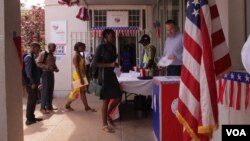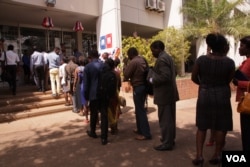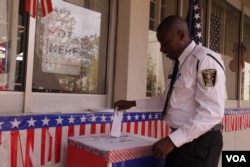Hillary Clinton, one of the two presidential candidates in the U.S. elections, has emerged the winner in a mock vote hosted Tuesday by the U.S. embassy in Malawi's capital, Lilongwe.
More than 300 Malawians, mostly university students, came to the U.S. embassy to vote while the mock polls were open from 5 a.m. to 6 p.m.
The final results show that 268 people voted for Clinton, a Democrat, while 53 voted for Republican Donald Trump.
The voters told VOA they were excited to participate.
“I have voted today because at least I have an idea of how American elections are conducted,” said Olina Sachisani, who attends the Malawi Institute of Journalism. “So my voting has enabled me to make a choice, which although would not count much, but at least as a student and a citizen of Malawi, I had that opportunity to participate [in the electoral process]."
The voters had different opinions on who would win the actual election in the United States.
"I could say Hillary Clinton could win because she has already put out a [better] fight than Donald Trump, because he has been busy accusing other persons instead of setting his goals and telling us what he would do [if elected]," said Frank Nowa, who attends the Malawi College of Accountancy.
African Bible College student Ndamya Mwanjabe is not so sure.
"Because at first when I was coming to vote, I had in mind that Hillary Clinton would win,” Mwanjabe said, “but now what I have learned inside there, they have said that it is not all the time that the one who has got more popular votes can be voted to be a president. So as of now it is really difficult to tell who is going to win."
The public affairs officer at the U.S. Embassy, Edward Monster, told VOA the mock elections were largely aimed to celebrate democracy, which Malawi and the United States enjoy.
"Unfortunately, that is not the case with other countries around the world,” Monster said. “So here in Malawi, we are celebrating today our democracy. We are celebrating the ability and the right and the responsibility of citizens in democracy to exercise their responsibility to vote and elect their leaders."
The event aimed to teach university students about the U.S. electoral process.
Embassy staffer Millington Bergeson-Lockwood made a presentation about the electoral college, an aspect of the U.S. presidential vote that often confuses foreign observers. He said many students were curious.
"The Malawian students were very engaged,” Bergeson-Lockwood said. “Their questions were great. They asked tough questions, and you can tell that they are really interested in their own democracy."
After voting in their mock elections, Malawians are now eager to see if the official U.S. results will reflect their choice.






